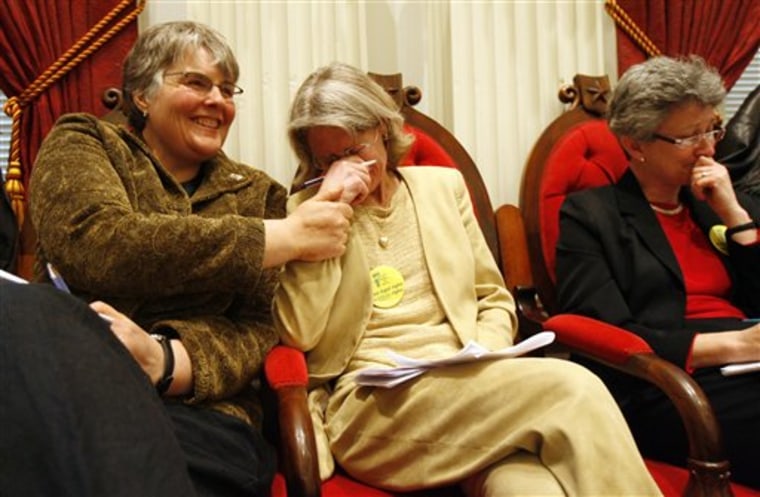The next battleground over gay marriage could be the U.S. Capitol.
A preliminary vote by the District of Columbia city council to recognize same-sex marriages performed elsewhere puts the issue on a path to Congress, which has final say over D.C.'s laws. That may force lawmakers to take up the politically dicey debate after years of letting it play out in the states.
"Let's be clear, this is a new era," openly gay D.C. Council member David Catania said Wednesday, expressing optimism that the city's law would clear Congress after a final council vote in May.
The council's unanimous vote Tuesday came the same day Vermont became the fourth state to legalize gay marriage and the first to do so with a legislature's vote. Court rulings led to same-sex marriages in the three other states where it's legal: Connecticut, Massachusetts and Iowa.
Like the measure approved in D.C., New York also recognizes same-sex marriages performed elsewhere but hasn't issued its own marriage licenses for gay and lesbian couples.
D.C. situation unique
The situation in D.C. is unique, though. After the legislation receives final approval from the council, which is supposed to come next month, the bill is then subject to a 30-day congressional review. That review could be the new Congress' first opportunity to signal its appetite for re-examining the Defense of Marriage Act, which bars federal recognition of same-sex marriages and allows states to do the same.
Since that federal law was passed in 1996, the debate has primarily played out in individual states.
Vermont became the first state to legalize civil unions — in 1999 — and Massachusetts was the first state to legalize same-sex marriages, which began taking place there in 2004.
Advocates see Washington holding symbolic importance in the debate, but some stressed that there isn't a dominant battleground in the quest for marriage equality.
"The district is equivalent to a small state, and the only difference is Congress' ability to interfere with local decisions," said David Smith, vice president of the Washington-based Human Rights Campaign. "We would treat it as any other state and move to defend the decision of the legislature or the courts."
However, Jennifer Pizer, marriage project director at New York-based Lambda Legal, noted that D.C. is unique and influential because of its national focus.
"There's important national attention on the things that happen in the district because it's the seat of the federal government," she said.
Opponents said it remains to be seen whether a Democrat-controlled Congress will have any interest in repealing the city's efforts. A spokesman for a House subcommittee that oversees the city's affairs said Wednesday that the subcommittee was not commenting on the D.C. measure. Congress is in recess through April 17.
Christian group considers strategies
Peter Sprigg, vice president for policy at the Family Research Council, a Christian organization that opposes same-sex marriage, said the group was considering several strategies, including a legal challenge on whether the legislation violates the Defense of Marriage Act, which defines marriage as between a man and a woman.
"I'm concerned that every step closer to same-sex marriage that does not meet resistance makes it easier for some people to accept same-sex marriage down the road," Sprigg said.
The Obama Administration has spoken of working with Congress to repeal the Defense of Marriage Act, which was signed into law by President Bill Clinton. John Berry, who is gay and supports repealing the federal policy that defines marriage as between a man and a woman, was confirmed by the Senate last week to lead the Office of Personnel Management.
Rep. Niki Tsongas, D-Mass., said she hopes the momentum of the D.C. Council's vote, along with the recent changes in Iowa and Vermont, "will bring our country closer to recognizing the right of consenting individuals in monogamous, long-term relationships to marry." Tsongas added that she would strongly advocate for the D.C. law in Congress.
The issue of same-sex relationships in D.C. has previously run into trouble on Capitol Hill.
The district passed a law in 1992 recognizing domestic partnerships, which extended medical decision-making powers and other benefits to same-sex couples. But Congress restricted the city from spending its own funds to implement the law until 2002.
City officials say it's rare for Congress to meddle in local affairs, but it's not unprecedented.
Recently, lawmakers unhappy with D.C.'s strict gun control measures have tried to weaken the regulations by attaching an amendment to a bill giving the city its first full vote in Congress.
"Everyone would agree we have a tricky relationship with Congress, even when our allies are in power," said Catania, who is pledging to introduce a measure soon that would legalize same-sex marriages in the district. "But progress is made by moving forward, not standing still."
